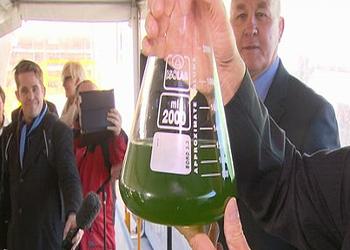
SYDNEY, Australia, July 5, 2013 (ENS) – In a world’s first, Algae.Tec has signed a deal with Australia’s largest power company to site an algae carbon capture and biofuels production facility beside a big coal-fired power station near Sydney.
Owned by the New South Wales government, Macquarie Generation has signed an agreement to site the Algae.Tec facility next to the 2,640 megawatt Bayswater coal-fired power station in the Hunter Valley in New South Wales.

The announcement was made July 2 by NSW Resources and Energy Minister Chris Hartcher in the presence of Macquarie Generation CEO and Managing Director Russell Skelton and Algae.Tec Executive Chairman Roger Stroud.
“We are always keen to support the development of a clean and viable biofuels industry – especially when that industry continues to be such an important source of employment for regional New South Wales,” said Hartcher.
“This deal is an innovative means of capturing and reusing carbon emissions and providing the Hunter region with a locally produced green fuel source,” Hartcher said.”It’s designed to deliver a new source of aviation fuel so Australia doesn’t have to import so much of its aviation fuel.”
“This innovation offers great promise for an industry vital to NSW, giving it a long term and sustainable future,” said Hartcher.
Algae.Tec Ltd, founded in 2007, is an Australian company that has developed a high-yield enclosed algae growth and harvesting system, the McConchie-Stroud System.
In the first phase of the A$140 million project, slated to begin next year, 400 closed tanks will be filled with carbon dioxide emitted from Bayswater to stimulate the growth of the algae inside.
The bioreactors, about the size of shipping containers, are designed to grow non-GMO algae on an industrial scale for biofuel production to replace fossil fuels.

The resulting algal oil, a form of vegetable oil, will be converted to biodiesel and hydrogenated to grade A jet fuel at the new biofuels production facility, while waste vegetable matter will be converted into pellets for cattle feed.
Macquarie Generation CEO and Managing Director Russell Skelton said, “Our agreement with Algae.Tec is another example of MacGen finding creative ways to improve our business and improve our environmental performance. Its new technology is improving a traditional power plant.”
Carbon pricing, commonly referred to as a carbon tax, was introduced by the Gillard Government on July 1, 2012. It requires businesses emitting over 25,000 tonnes of carbon dioxide equivalent emissions annually to purchase emissions permits.
The price of carbon in Australia rose to A$24.15 (US$22.27) a metric tonne on Monday, following an indexed rise in the federal government’s carbon tax.
“Carbon is now our single largest cost,” said Skelton. “This technology should reduce our carbon output, reduce our carbon bill, and at the same time improve our bottom line.”
The Algae.Tec project will make a “small but measurable difference” to Bayswater’s greenhouse gas emissions, says the algae company.
Bayswater now pumps out about 19 million tonnes of carbon dioxide gas a year; the project will capture about 270,000 tonnes of that CO2, ramping up to about 1.3 million tonnes after a few years.
The centerpiece of the New South Wales energy system, the Bayswater plant burns roughly 7.5 million tonnes of coal per year and delivers power to eastern Australia, from South Australia to Northern Queensland.

Stroud said algae biofuels will offer New South Wales and Australia a new level of fuel security.
“At a time when all the petroleum refining capacity is closing down in New South Wales, this is the beginning of an era of renewable fuel which can be ‘grown’ in the state and can substitute imported petroleum products,” Stroud said.
Added benefits of the deal are the creation of hundreds of regional jobs in a new and emerging industry for the Newcastle and Hunter region.
“With this announcement today, New South Wales stands out as a global leader in the adoption of renewable technologies that makes our existing power generation infrastructure cleaner and produces valuable fuel oil,” said Stroud.
The Algae.Tec solution requires less than one-tenth the land footprint of pond growth options, while its enclosed module system is designed to deliver the highest yield of algae per hectare, and solves the problem of food-producing land being turned over for biofuel production, he said.
Stroud said this deal reflects a genuine desire on the part of the New South Wales Government and the state’s power industry, to support solutions to mitigate carbon dioxide emissions from fossil fueled power stations.
In its first year, Australia’s carbon price has led to a 30 percent increase in renewable energy in the country, an eight percent drop in coal-fired electricity, and a nine percent drop in electricity pollution overall.
Copyright Environment News Service (ENS) 2013. All rights reserved.
© 2013, Environment News Service. All rights reserved. Content may be quoted only with proper attribution and a direct link to the original article. Full reproduction is prohibited.
